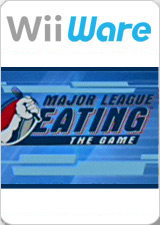Major League Eating: The Game
Major League Eating: The Game is a video game developed for the Wii console, centered around the competitive world of professional eating. This unique title was inspired by the actual organization known as Major League Eating (MLE), which oversees professional competitive eating events and contests worldwide. The game attempts to bring the intensity and excitement of these competitions to the living room, allowing players to experience the thrill of competitive eating in a virtual setting.
Gameplay[edit | edit source]
In Major League Eating: The Game, players select from a roster of real-life competitive eaters, each with their own unique abilities and stats. The objective is to consume as much food as possible within a given time limit, competing against either AI opponents or other players in multiplayer mode. The game incorporates various types of food, each presenting its own challenge, and players must use strategy and quick reflexes to out-eat their opponents.
The gameplay mechanics include a variety of actions such as chewing, swallowing, and burping, with the latter being used to prevent the character from vomiting. If a player's character vomits, they are penalized, reflecting the real-life rules of competitive eating contests. The game also features power-ups that can give players an edge over their competitors, such as temporary boosts in eating speed or digestion.
Characters[edit | edit source]
The characters in Major League Eating: The Game are based on actual competitive eaters from the Major League Eating circuit. Each character has their strengths and weaknesses, making the choice of eater strategic depending on the type of food in the contest. The inclusion of these real-life eaters adds an element of authenticity to the game, and fans of the sport will recognize many of the names and faces featured.
Development and Release[edit | edit source]
Developed by Video Game Development Company, Major League Eating: The Game was released exclusively for the Wii through its WiiWare service. The game leveraged the Wii's unique motion controls, allowing players to simulate eating motions with the Wii Remote, adding an immersive physical aspect to the gameplay. The development team worked closely with Major League Eating to ensure the game accurately represented the sport, from the types of food used in contests to the rules governing competitions.
Reception[edit | edit source]
Upon release, Major League Eating: The Game received mixed reviews from critics. Some praised the game for its originality and fun multiplayer experience, while others criticized it for its repetitive gameplay and novelty value that wore off quickly. Despite the mixed reviews, the game garnered attention for its unique premise and became a cult favorite among fans of the sport and those looking for a unique party game for the Wii.
Legacy[edit | edit source]
While Major League Eating: The Game did not spawn any direct sequels, its existence highlights the diverse range of experiences video games can offer. It stands as a testament to the creativity of game developers and the broad appeal of competitive eating as a sport. The game also contributed to the growing recognition of Major League Eating and its competitors, bringing the world of competitive eating to a wider audience.
Search WikiMD
Ad.Tired of being Overweight? Try W8MD's physician weight loss program.
Semaglutide (Ozempic / Wegovy and Tirzepatide (Mounjaro / Zepbound) available.
Advertise on WikiMD
|
WikiMD's Wellness Encyclopedia |
| Let Food Be Thy Medicine Medicine Thy Food - Hippocrates |
Translate this page: - East Asian
中文,
日本,
한국어,
South Asian
हिन्दी,
தமிழ்,
తెలుగు,
Urdu,
ಕನ್ನಡ,
Southeast Asian
Indonesian,
Vietnamese,
Thai,
မြန်မာဘာသာ,
বাংলা
European
español,
Deutsch,
français,
Greek,
português do Brasil,
polski,
română,
русский,
Nederlands,
norsk,
svenska,
suomi,
Italian
Middle Eastern & African
عربى,
Turkish,
Persian,
Hebrew,
Afrikaans,
isiZulu,
Kiswahili,
Other
Bulgarian,
Hungarian,
Czech,
Swedish,
മലയാളം,
मराठी,
ਪੰਜਾਬੀ,
ગુજરાતી,
Portuguese,
Ukrainian
Medical Disclaimer: WikiMD is not a substitute for professional medical advice. The information on WikiMD is provided as an information resource only, may be incorrect, outdated or misleading, and is not to be used or relied on for any diagnostic or treatment purposes. Please consult your health care provider before making any healthcare decisions or for guidance about a specific medical condition. WikiMD expressly disclaims responsibility, and shall have no liability, for any damages, loss, injury, or liability whatsoever suffered as a result of your reliance on the information contained in this site. By visiting this site you agree to the foregoing terms and conditions, which may from time to time be changed or supplemented by WikiMD. If you do not agree to the foregoing terms and conditions, you should not enter or use this site. See full disclaimer.
Credits:Most images are courtesy of Wikimedia commons, and templates Wikipedia, licensed under CC BY SA or similar.
Contributors: Prab R. Tumpati, MD

